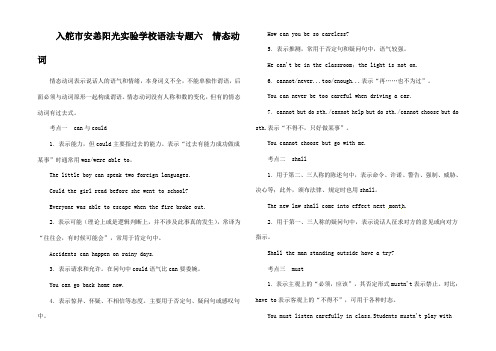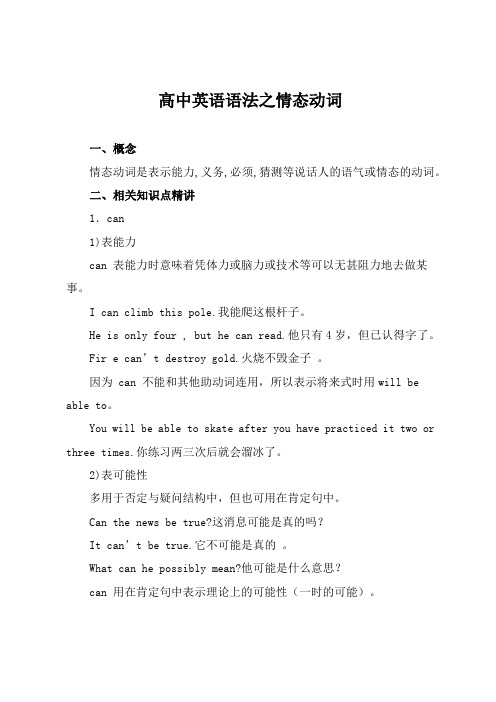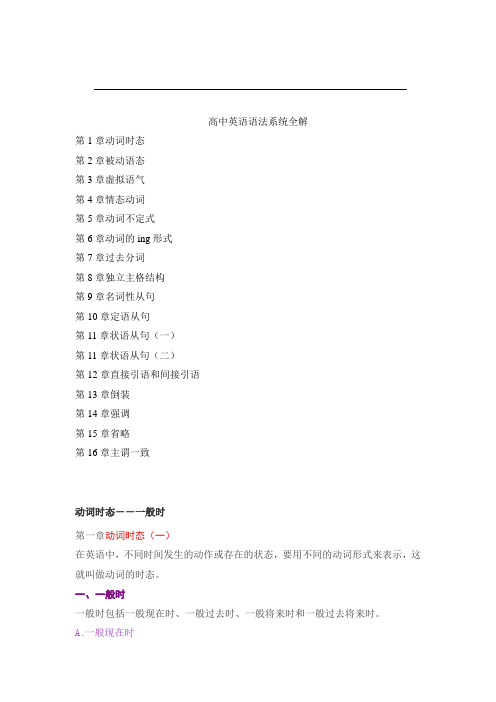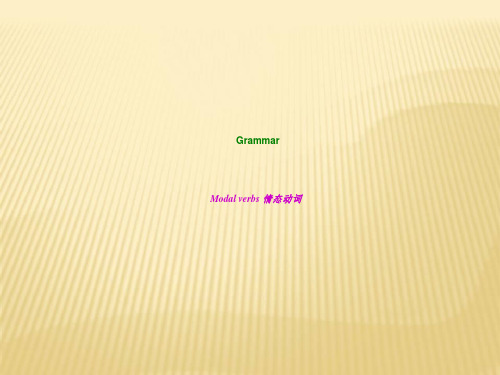高中英语语法情态动词课件
- 格式:ppt
- 大小:666.01 KB
- 文档页数:7

高中英语语法系列情态动词定义:情态动词表示说话人对某一动作或状态的态度。
特点:有一定词义;不受主语人称和数的变化影响;与主要动词的原形一起构成谓语。
情态动词:can/could ; may/might; must ;need ;will/would ; shall /should ; dare / dared ;used to ; ought to etc情态动词的基本用法1. can/coulda. 表能力,could 主要指过去时间1) Two eyes can see more than one .2) The girl could read before she went to school .* be able to do 意思同can/could ,但有较多时态表达形式;在表达过去某个事件有能力干什么时,could 表虽有能力,但不一定做了;was able to 指“不但有能力,而且实际做了”。
3) He _______ escape from the fire , but he went to save the girl .( could /was able to )4) Though the fire spread quickly , everyone ________ escape . ( could /was able to )b. 表可能5) The man there can’t be Mr. Zhang . He has gone to Nanjing .6) Look ! Someone is coming ! Who can it be ?7) * The temperature can fall to – 60 °C8) * He can make mistakes sometimes though he is clever .c. 表允许9) ---Can / Could I use your pen ?--- Yes , you can ./ Sure , go ahead . ( Yes , you could 错误 )d . 表惊异,怀疑,不相信等态度(用于否定句,疑问句或感叹句中)10) Can this be an excuse for being late ?11) No , no , this can’t be true .12) How can you be so careless!2. may / mighta. 表允许13) --- May / Might I ask you for a photo of your baby ?--- Yes , please . / Certainly ./ Please don’t ./ You’d better not ./ No , you mustn’t.b. 表可能,might 语气更加不肯定14) She may be at home .15) She might come to the party , but I am not sure .c .祝愿16) May you succeed !3 . musta . 表义务,意为“必须”,主观意志;而have to 为“不得不”,客观要求。






高中英语语法讲解:情态动词概述1.共有10个情态动词:can/could, may/might, will/would, shall, should, ought to, must;2个半情态动词need, dare2.特点:(1)情态动词后加动词原形(即不带to的不定式)一起构成谓语;(2)没有人称和数的变化;(3)多数情态动词有过去式,但其过去式有时并不表示时态,而只起“委婉或不确定语气”的作用。
Would you do me a favour? She may/might be watering the flowers now.3.情态动词在句子中可发挥不同作用,如表能力,表责任与义务,表推测,表征求允许,表请求,表建议,表语气态度等等He can/could run 100 meters in 11 seconds.You should/ought to/must work hard to win a gold medal.Can/Could/May/Might I watch the Olympics tonight?Will/Can/Could/Would you help me with my training?He might/may/could/should/ought to/will/must watch the football match tonight.I suggest that you should watch the opening ceremony.Can this be true?4.情态动词+do 表对一般现在或将来情况的推测情态动词+ be doing 表对正在发生的事情的推测情态动词+have done 表对过去已经发生的事情的推测一、can/could 的用法1.表能力(1) can do现在一般的能力(2) could do过去一般的能力(3) could have done过去有能力做但没做具体某事(4)was/were able to do = managed to do/ succeeded in doing 过去有能力做且做了具体某事。



入舵市安恙阳光实验学校语法专题六情态动词情态动词表示说话人的语气和情绪,本身词义不全,不能单独作谓语,后面必须与动词原形一起构成谓语。
情态动词没有人称和数的变化,但有的情态动词有过去式。
考点一can与could1.表示能力,但could主要指过去的能力。
表示“过去有能力成功做成某事”时通常用was/were able to。
The little boy can speak two foreign languages.Could the girl read before she went to school?Everyone was able to escape when the fire broke out.2.表示可能(理论上或是逻辑判断上,并不涉及此事真的发生),常译为“往往会,有时候可能会”,常用于肯定句中。
Accidents can happen on rainy days.3.表示请求和允许。
在问句中could语气比can要委婉。
You can go back home now.4.表示惊异、怀疑、不相信等态度。
主要用于否定句、疑问句或感叹句中。
How can you be so careless?5.表示推测,常用于否定句和疑问句中,语气较强。
He can't be in the classroom;the light is not on.6.cannot/never...too/enough...表示“再……也不为过”。
You can never be too careful when driving a car.7.cannot but do sth./cannot help but do sth./cannot choose but do sth.表示“不得不,只好做某事”。
You cannot choose but go with me.考点二shall1.用于第二、三人称的陈述句中,表示命令、许诺、警告、强制、威胁、决心等;此外,颁布法律、规定时也用shall。


高中英语语法之情态动词一、概念情态动词是表示能力,义务,必须,猜测等说话人的语气或情态的动词。
二、相关知识点精讲1.can1)表能力can 表能力时意味着凭体力或脑力或技术等可以无甚阻力地去做某事。
I can climb this pole.我能爬这根杆子。
He is only four , but he can read.他只有4岁,但已认得字了。
Fir e can’t destroy gold.火烧不毁金子。
因为 can 不能和其他助动词连用,所以表示将来式时用will be able to。
You will be able to skate after you have practiced it two or three times.你练习两三次后就会溜冰了。
2)表可能性多用于否定与疑问结构中,但也可用在肯定句中。
Can the news be true?这消息可能是真的吗?It can’t be true.它不可能是真的。
What can he possibly mean?他可能是什么意思?can 用在肯定句中表示理论上的可能性(一时的可能)。
Attending the ball can be very exciting.The road can be blocked.这条路可能会不通的。
may 在肯定句中表示现实的可能性。
The road may be blocked.这条路可能不通了。
3)表示允许(和 may 意思相近)常见于口语。
Can (May) I come in ?我能进来吗?Can I smoke here ?我可以在这里抽烟吗?2.could 的用法1)表过去的可能和许可,(多用于间接引语中)At that time we thought the story could not be true.那时我们认为所说的事不可能是真的。
Father said I could swim in the river.爸爸说我可以在河里游泳。



高中英语语法系统全解第1章动词时态第2章被动语态第3章虚拟语气第4章情态动词第5章动词不定式第6章动词的ing形式第7章过去分词第8章独立主格结构第9章名词性从句第10章定语从句第11章状语从句(一)第11章状语从句(二)第12章直接引语和间接引语第13章倒装第14章强调第15章省略第16章主谓一致动词时态--一般时第一章动词时态(一)在英语中,不同时间发生的动作或存在的状态,要用不同的动词形式来表示,这就叫做动词的时态。
一、一般时一般时包括一般现在时、一般过去时、一般将来时和一般过去将来时。
A.一般现在时1.一般现在时的构成一般现在时主要用动词原形来表示。
主语是第三人称单数时,动词后面要加-s 或-es。
They want good jobs.他们想要好的工作。
The coat matches the dress.外衣和裙子很相配。
This work does not satisfy me.这项工作我不满意。
Do you understand?你懂了吗?2.一般现在时的用法①一般现在时的基本用法a.表示现在习惯性的动作或存在状态He always takes a walk after supper.晚饭后他总是散散步。
Everyone is in high spirits now.现在大家都情绪高涨。
b.表示客观事实或普遍真理The sun rises in the east and sets in the west.太阳从东方升起在西方落下。
Sound travels faster through water than it does through air.声音在水中的传播速度要比在空气中快。
Time and tide wait for no man.时间不等人。
c.表示主语的特征、能力和状态This cloth feels soft.这布摸上去很软。
I love classical music.我喜欢古典音乐。


1 比较can 和be able to1)can/could 表示能力;可能(过去时用could), 只用于现在式和过去式(could)。
be able to可以用于各种时态。
例如:They will be able to tell you the news soon. 他很快就能告诉你消息了。
表示成功地做了某事时,用was/were able to,不能用could。
例如:He was able to flee Europe before the war broke out. = He managed to flee Europe before the war broke out.2)提出委婉的请求,(注意在回答中不可用could)。
例如:--- Could I have the television on? 我能看电视吗?--- Yes, you can. / No, you can\‘t. 可以/不可以。
3)在否定句、疑问句中表示推测或怀疑。
例如:He couldn\’t be a bad man. 他不大可能是坏人。
Could he help us ?The girl couldn’t have stolen your electronic dictionary .•4)有时会,he can be difficult to get along with , even though he is good 5)否定推测用can\'t。
例如:If Tom didn\'t leave here until five o\'clock, he can\'t be home yet.如果汤姆五点才离开这儿,他此时一定还未到家。
2 比较may和might1)表示允许或请求;表示没有把握的推测;may 放在句首,表示祝愿。
例如:May God bless you! 愿上帝保佑你!He might be at home. 他可能在家。

